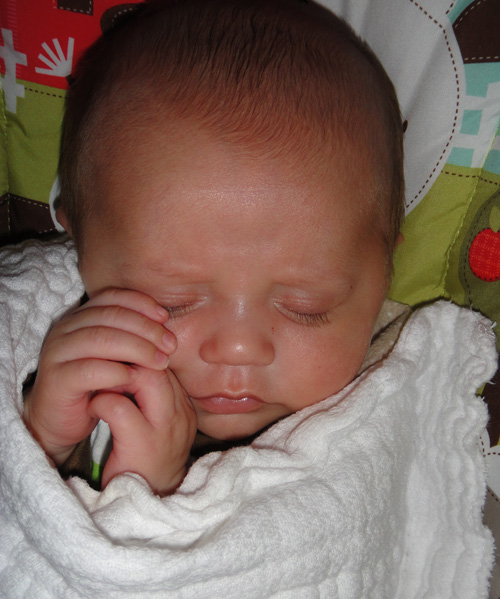My daughter showed great courage dealing with her baby’s murder
(Bryan at 11 weeks old)
In the weeks leading up to her husband’s murder trial in September of last year, my daughter Angie was nervous.
She was fully aware that many victims of violent crimes in America are victimized twice – once from the crime and then from a traumatic trial-court experience.
That’s because the attorneys defending rapists, murderers and other violent offenders often try to convince a jury that the victim – and not their client – committed the crime. In a few rare cases, the strategy works, with a rapist or murderer going free.
It’s a vicious, cynical approach that flies in the face of the judicial-system philosophy that trials are supposed to arrive at the truth. But it’s used time and again in the United States, re-traumatizing victim after victim.
Angie’s husband Kaliq Mansor was facing life in prison on charges of killing their 11-week-old son Bryan in June of 2011 and physically abusing Bryan’s twin brother, Ethan. (See the first story here.)
So Angie, who lives in a suburb of Portland, Oregon, had no illusions about what would happen to her when she testified in Kaliq’s trial: She expected his defense attorney, Russell Barnett, to insinuate that she – and not Kaliq – had killed Bryan. And that’s exactly what Barnett did.
At first, her husband’s attorney suggested that Angie killed her son by accident.
A few weeks before Bryan’s death, she took Bryan and Ethan for a walk in the twins’ double-stroller. For safety’s sake, she always strapped each boy into a hard-plastic car seat, placed the seat in the stroller, then used latches to secure both seats in the stroller at the same time.
One day, after placing one of the car seats in the stroller, she bent down to pick up the second seat, and the yet-to-be-latched first seat slipped out. The sturdy device “did its job,” she told me later. Not only did the tumble fail to hurt the strapped-down baby in the car seat, but he never even woke up.
Barnett suggested in court that the car-seat tumble had caused Bryan’s death. It was a ludicrous insinuation. Bryan had died of a massive brain hemorrhage resulting from violent shaking, according to Dr. Dan Leonhardt, who wrote the medical report on his death.
Barnett then shifted from insinuating that Angie had accidentally killed Bryan to the nastier insinuation that she had deliberately killed him to frame Kaliq.
Barnett goaded her with the question: “You have a lot to gain financially if your ex-husband goes to prison, don’t you?”
He was referring to $60,000 in Kaliq’s employee retirement account and a few other assets.
Angie replied: “No I don’t.”
Barnett persisted, repeating the question. Angie responded: “It’s not that much money. I’d get more if Mr. Mansor were working and paying child support” for the surviving baby, Ethan.
Barnett wouldn’t let the issue drop, however. His intent was to needle Angie into a display of temper. If he could provoke her to anger, he might be able to make a juror think she was capable of committing the kind of violence that killed Bryan.
The magic number here is one juror. All 12 jurors must agree on a verdict. If one juror refuses to go along, it leads to what’s called a hung jury. At that point, a prosecutor must decide whether to retry the case – and sometimes prosecutors don’t.
After Barnett goaded her a third time with the financial-gain question, “I’d had it,” Angie told me.
“Frankly, I don’t give a damn about the money,” she responded, keeping her temper under control but with a decided edge to her voice from Barnett’s provocations. “I want my (murdered) child back.”
She had handled the grilling well. A savvy trial attorney, Barnett must have realized that his effort to browbeat her into making a mistake on the witness stand had disgusted the jury. He never asked her another question.
When the jury returned guilty verdicts on all 10 of the murder, assault and child-abuse counts against Kaliq, Angie and the rest of our family could begin letting go of months of pent-up stress. Justice had been served.
But how much justice? Kaliq’s sentence would be the key. If Judge Don Letourneau gave him a light sentence, he could be out of prison early enough to pose a threat to Angie and to a still-young Ethan.
Our family had a chance to affect the judge’s decision on length of sentence by writing what the courts call “victim’s impact statements.” Each of us – Angie, my son Dan, my former wife Judy Lawrence and I – poured our hearts into those statements.
All four of us are good writers, and our statements expressed in powerful emotional terms the devastation we’d suffered from Bryan’s death.
Angie’s statement was the most gut-wrenching. It read in part:
“If Mr. Mansor had shown any remorse at any point or admitted what he had done, I would have supported a lesser sentence. But because he has been unable to summon the courage to admit killing Bryan and abusing Ethan, I fear that he is incapable of ever admitting the truth, whether to himself or society. I believe he knows full well what he has done, but as I watched him testify on the stand, I saw him for the first time as the sociopath that I believe he is – someone who lacks a sense of moral responsibility or social conscience.”
She added:
“If Mr. Mansor were truly innocent, he would be angry about being in prison for the last 15 months. If he were innocent, he would be mourning Bryan’s death. If he were innocent, he would have asked about Ethan’s well-being, to see pictures, or try to get any scrap of information that he could to make sure that his son was OK.” He had never done any of those things, she said.

In his victim’s impact statement, my son Dan recalled Angie struggling to walk at the funeral home where Bryan’s funeral arrangements were being made. As he helped her maintain her balance, he remembered her saying: “This can’t be real. I don’t want this to be real. I can’t possibly be arranging a funeral for my beautiful baby boy.” Dan’s statement added: “And her pain continued, not for the next week, but for months and months, and even until now, over a year later.”
He concluded: “My sister will survive this trauma, but in this life, she will never have her son Bryan back again and our family will never be the same.”
Part of Judy’s statement focused on the pain that Ethan will have to endure when he learns why his brother died and his father is in prison.
“Every time he sees twins playing together, will it be a stab in his heart like it is for Angie and me?” Judy asked rhetorically. “Will he ache like we do for what could have been? Will he dream about his twin like we do? The nightmares are mostly gone for me now, but I still dream of Bryan. And in my dreams he is 18 months old, just like his brother, and they are having a grand time together, frolicking and laughing. And then I wake up to reality. But my reality is nothing compared to my daughter’s.”
My statement dealt with the suffering that the murder had visited on all of us – Angie, Dan, Judy, Ethan and I – and what society might have gained if Bryan had lived. God has given our family special talents in writing and music. What could Bryan have contributed to making the world better?

But my most poignant words were about what Ethan faces. “Angie almost broke my heart recently when she told me how sociable Ethan is, how he loves tiny babies even at his tender age, how he loves to watch over them and take care of them,” I said. “What cruelty it was to rob him of a loving brother who could have been his compatriot and mirror image all his life.”
Then I told the judge: “There is only one way to salve the deep loss that Angie, Ethan and the rest of my family have suffered from Bryan’s death – and that is to give the murderer the maximum sentence for his crime that the law will allow.”
Judge Letourneau’s sentence was what we had hoped for: life in prison with the earliest possibility of parole in 28 years. Kaliq will be behind bars until he’s 61.
In many years of writing and editing murder stories as a journalist, I’ve never heard a judge speak in court about the power of victims’ impact statements. But Judge Letourneau did so at Kaliq’s sentencing.
While Kaliq had shown no remorse for his crimes, Angie’s and the rest of our family’s words were “very moving,” the judge said. He added: “The statements were heartfelt and heart-wrenching.”
I remembered thinking afterward how grateful I was that God had given my family gifts in writing.
Judge Letourneau’s stiff sentence means that Ethan will be 30 when his father leaves prison. That day will be traumatic for him, but he will be well into manhood by then – and he’ll be able to cope.
Now that the trial, the sentencing and a contentious divorce proceeding are over, Angie can begin a new life.
Her family and scores of wonderful friends will be there to support her on her inevitable down days, as they have for more than 18 months.
But Angie is a strong, loving and positive person – and I have no doubt she’ll create a productive and happy life for herself.
I hope her future includes performing in Kazakhstan.

Music is one of her great loves – and the sooner she returns to it, the quicker she’ll heal.
Angie was only 3 when she clambored up a piano and began playing by ear. She started writing songs before she was a teen-ager, then majored in music at the University of California at Berkeley.
After university she began singing and produced two CDs of her songs. And the Angie Foster Band became a fixture of Portland’s music scene.
You can hear some of her pop, jazz and blues songs here on the Baltimore Post-Examiner website, My journalist friend Tim Maier, who founded the site, admires Angie’s music and courage. His support has been a great encouragement to her.
The last song Angie wrote, in June of 2011, was for Bryan. She wasn’t in the frame of mind to compose but she forced herself to – because she was determined to sing a tribute to Bryan at his funeral.
Several times since then I’ve encouraged her to return to her music to help with her healing. “Thanks,” she’s responded. “I can’t right now. It’s just not in me.”
“I’m sure you will when the time is right,” I said.
I’d like to see Angie perform in Kazakhstan for two reasons. First, I think Kazakhs would her music and the kind of person she is.
And, second, Kazakhstan has a wonderful musical tradition, with great talent. I’d like to see her play with some of the terrific musicians this country has produced.
In fact, I already have possibilities in mind. Because Angie’s repertoire includes jazz and blues, I’ve approached the Almaty International Jazz Festival about her. The folks there produce an annual concert every spring.
I’ve also asked my friend Rustam Ospanov, who puts together the Jazzystan concerts in Almaty, for suggestions about where Angie could perform in Kazakhstan’s biggest city.
I’d like to see her perform in Astana as well. One possibility would be a concert with students at the Kazakhstan National University of Arts, many of whom are already top-flight musicians.
Ultimately, whether Angie performs in Kazakhstan depends on such factors as whether her emotional healing has reached the point where she can travel again, and whether she can get time off from her day job of technical writing.
I’m convinced Kazakhstan would be an uplifting experience for her, generating new friendships and requenching her zest for living.
If she does decide to come, I’ll let you loyal readers be among the first to know.
(Writer Hal Foster appears here under a partnership with Tengrinews)

Hal Foster is a longtime journalist and journalism professor who has worked in the United States, Japan, Ukraine and Kazakhstan. His news career has included writing and editing at the Los Angeles Times and nine years as a journalist in Japan. He is an associate professor of Communication at the new Nazarbayev University in Astana, Kazakhstan. Catch one of his other blogs at en.tengrinews.kz.

